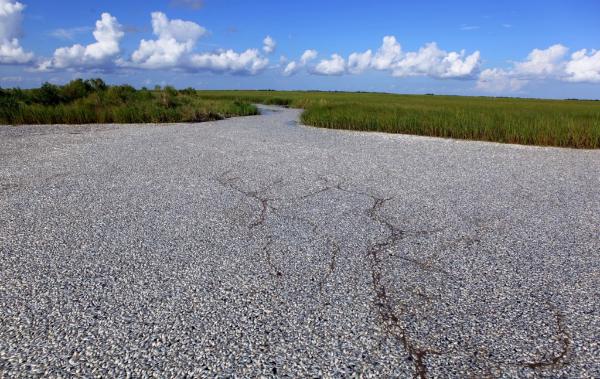- Joined
- Mar 12, 2009
- Messages
- 13,160
- Points
- 0
Massive fish kill reported in Louisiana
Tue Sep 14, 12:36 pm ET
By Brett Michael Dykes
<--- http://news.yahoo.com/s/yblog_upsho...lYwN5bl90b3Bfc3RvcmllcwRzbGsDbWFzc2l2ZWZpc2hr

What you see above isn't a rural gravel road. It's a Louisiana waterway, its surface completely covered with dead sea life -- a mishmash of species of fish, crabs, stingray and eel. New Orleans CBS affiliate WWL-TV reports that even a whale was found dead in the area.
Fish kills are fairly common along the Gulf Coast, particularly during the summer in the area near the mouth of the Mississippi, the site of this kill. The area is rife with dead zones -- stretches where sudden oxygen depletion can cause widespread death. But those kills tend to be limited to a single species of fish, rather than the broad sort of die-off involved in this kill.
And therein lies the concern of Gulf residents, who suspect this may be yet another side effect of the catastrophic BP oil spill.
Plaquemines Parish President Billy Nungesser sounded the alarm bells Monday, distributing the photos here to the local media. Nungesser said that no testing is currently planned to determine how the kill may relate to the BP oil disaster, but he pleaded with officials from the Louisiana Department of Wildlife and Fisheries, the Environmental Protection Agency and the National Oceanic and Atmospheric Administration to investigate.

"We can't continue to see these fish kills,'' Nungesser said in a statement. "We need some additional tests to find out why these fish are dying in large numbers. If it is low oxygen, we need to identify the cause."
Dead zones are increasingly common in the world's oceans. But they're particularly so off Louisiana, because nutrient-rich water and sediment from the nation's agricultural runoff travels downriver and is dumped into the Gulf. Various species of single-celled plantlike organisms flourish in waters enriched with chemical nutrients -- organisms that go on to vastly deplete the oxygen in the water they inhabit.
Many scientists have feared that an influx of oil-eating microbes would lead to more Gulf Coast dead zones, since the microbes use large amounts of oxygen when they consume the oil particles produced by chemical dispersants.
<object width="640" height="385"><param name="movie" value="http://www.youtube.com/v/2n_9u7oaoM8&color1=0xb1b1b1&color2=0xd0d0d0&hl=en_US&feature=player_embedded&fs=1"></param><param name="allowFullScreen" value="true"></param><param name="allowScriptAccess" value="always"></param><embed src="http://www.youtube.com/v/2n_9u7oaoM8&color1=0xb1b1b1&color2=0xd0d0d0&hl=en_US&feature=player_embedded&fs=1" type="application/x-shockwave-flash" allowfullscreen="true" allowScriptAccess="always" width="640" height="385"></embed></object>
Tue Sep 14, 12:36 pm ET
By Brett Michael Dykes
<--- http://news.yahoo.com/s/yblog_upsho...lYwN5bl90b3Bfc3RvcmllcwRzbGsDbWFzc2l2ZWZpc2hr

What you see above isn't a rural gravel road. It's a Louisiana waterway, its surface completely covered with dead sea life -- a mishmash of species of fish, crabs, stingray and eel. New Orleans CBS affiliate WWL-TV reports that even a whale was found dead in the area.
Fish kills are fairly common along the Gulf Coast, particularly during the summer in the area near the mouth of the Mississippi, the site of this kill. The area is rife with dead zones -- stretches where sudden oxygen depletion can cause widespread death. But those kills tend to be limited to a single species of fish, rather than the broad sort of die-off involved in this kill.
And therein lies the concern of Gulf residents, who suspect this may be yet another side effect of the catastrophic BP oil spill.
Plaquemines Parish President Billy Nungesser sounded the alarm bells Monday, distributing the photos here to the local media. Nungesser said that no testing is currently planned to determine how the kill may relate to the BP oil disaster, but he pleaded with officials from the Louisiana Department of Wildlife and Fisheries, the Environmental Protection Agency and the National Oceanic and Atmospheric Administration to investigate.

"We can't continue to see these fish kills,'' Nungesser said in a statement. "We need some additional tests to find out why these fish are dying in large numbers. If it is low oxygen, we need to identify the cause."
Dead zones are increasingly common in the world's oceans. But they're particularly so off Louisiana, because nutrient-rich water and sediment from the nation's agricultural runoff travels downriver and is dumped into the Gulf. Various species of single-celled plantlike organisms flourish in waters enriched with chemical nutrients -- organisms that go on to vastly deplete the oxygen in the water they inhabit.
Many scientists have feared that an influx of oil-eating microbes would lead to more Gulf Coast dead zones, since the microbes use large amounts of oxygen when they consume the oil particles produced by chemical dispersants.
<object width="640" height="385"><param name="movie" value="http://www.youtube.com/v/2n_9u7oaoM8&color1=0xb1b1b1&color2=0xd0d0d0&hl=en_US&feature=player_embedded&fs=1"></param><param name="allowFullScreen" value="true"></param><param name="allowScriptAccess" value="always"></param><embed src="http://www.youtube.com/v/2n_9u7oaoM8&color1=0xb1b1b1&color2=0xd0d0d0&hl=en_US&feature=player_embedded&fs=1" type="application/x-shockwave-flash" allowfullscreen="true" allowScriptAccess="always" width="640" height="385"></embed></object>








